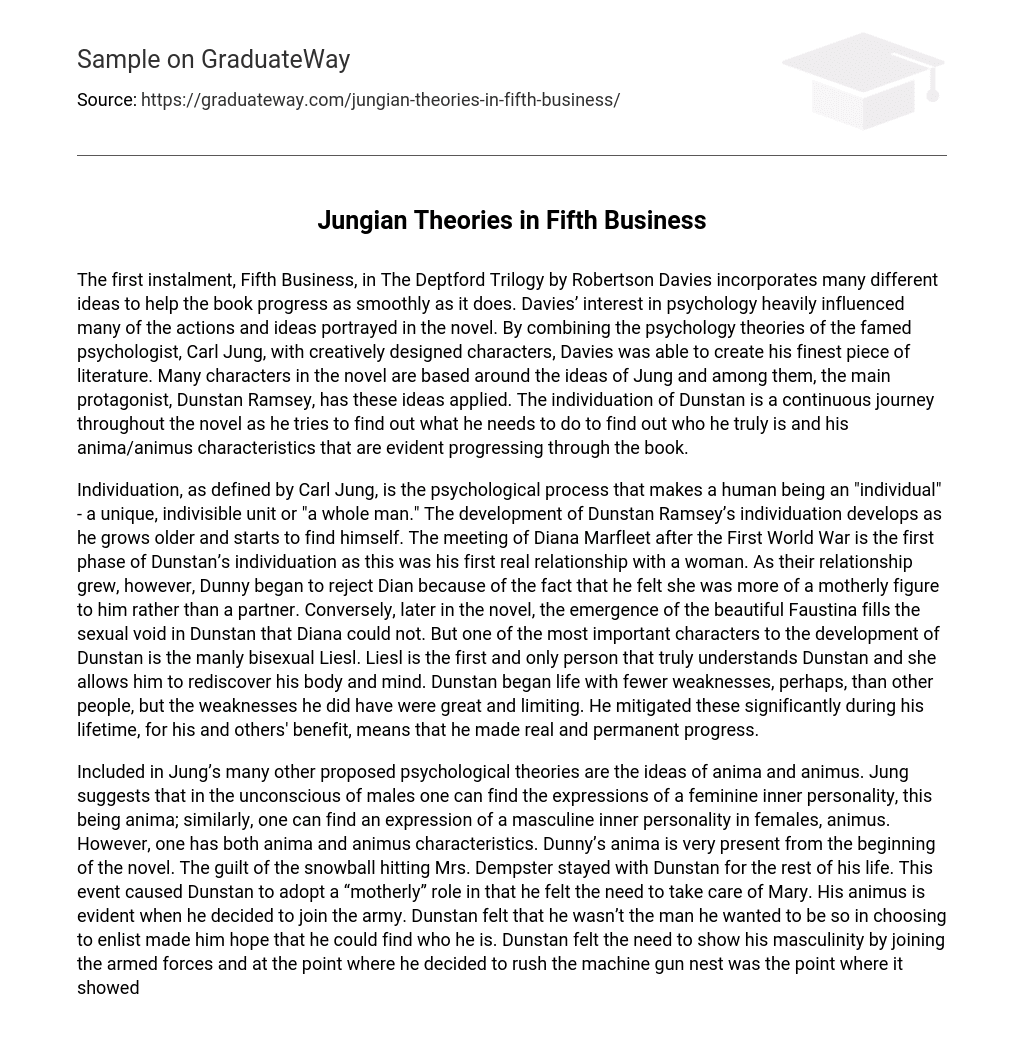The first instalment, Fifth Business, in The Deptford Trilogy by Robertson Davies incorporates many different ideas to help the book progress as smoothly as it does. Davies’ interest in psychology heavily influenced many of the actions and ideas portrayed in the novel. By combining the psychology theories of the famed psychologist, Carl Jung, with creatively designed characters, Davies was able to create his finest piece of literature. Many characters in the novel are based around the ideas of Jung and among them, the main protagonist, Dunstan Ramsey, has these ideas applied. The individuation of Dunstan is a continuous journey throughout the novel as he tries to find out what he needs to do to find out who he truly is and his anima/animus characteristics that are evident progressing through the book.
Individuation, as defined by Carl Jung, is the psychological process that makes a human being an “individual” – a unique, indivisible unit or “a whole man.” The development of Dunstan Ramsey’s individuation develops as he grows older and starts to find himself. The meeting of Diana Marfleet after the First World War is the first phase of Dunstan’s individuation as this was his first real relationship with a woman. As their relationship grew, however, Dunny began to reject Dian because of the fact that he felt she was more of a motherly figure to him rather than a partner. Conversely, later in the novel, the emergence of the beautiful Faustina fills the sexual void in Dunstan that Diana could not. But one of the most important characters to the development of Dunstan is the manly bisexual Liesl. Liesl is the first and only person that truly understands Dunstan and she allows him to rediscover his body and mind. Dunstan began life with fewer weaknesses, perhaps, than other people, but the weaknesses he did have were great and limiting. He mitigated these significantly during his lifetime, for his and others’ benefit, means that he made real and permanent progress.
Included in Jung’s many other proposed psychological theories are the ideas of anima and animus. Jung suggests that in the unconscious of males one can find the expressions of a feminine inner personality, this being anima; similarly, one can find an expression of a masculine inner personality in females, animus. However, one has both anima and animus characteristics. Dunny’s anima is very present from the beginning of the novel. The guilt of the snowball hitting Mrs. Dempster stayed with Dunstan for the rest of his life. This event caused Dunstan to adopt a “motherly” role in that he felt the need to take care of Mary. His animus is evident when he decided to join the army. Dunstan felt that he wasn’t the man he wanted to be so in choosing to enlist made him hope that he could find who he is. Dunstan felt the need to show his masculinity by joining the armed forces and at the point where he decided to rush the machine gun nest was the point where it showed his need for more masculinity.
Dunstan’s wonder and desire to find ways to lift the guilt of the snowball off his shoulders is evident in his journey to find out who he really is. Through meeting people from Mary and Paul, Boy and Leola, Liesl and Faustina, helped Dunstan in reaching individuation. And by his unique anima and animus characteristics, Dunstan was able to find out what he wanted in life and what he wanted to give to others. Both Jungian theories are connected to Dunstan Ramsey in Davies’ Fifth Business.





